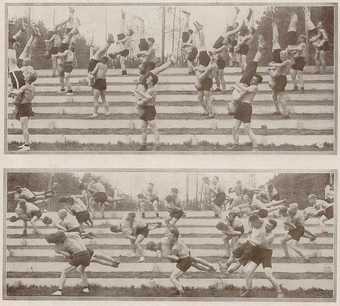The New Great Power (Die Neue Grossmacht)
Wilhelm Prager, Germany 1925, 60 min
Tate Modern presents for the first time in the UK a famous documentary of the First Workers’ Olympic Games in Frankfurt, 1925.
The film by Wilhelm Prager, The New Great Power, is an early masterpiece of social cinema. Combining modernism and realism in a dramatic narrative of the games, it sent a strong message of empowerment and engagement to the international workers’ movement.
The film will be introduced by Ulrich Lehmann, who will provide a brief history of the Workers’ Olympiads and their role in shaping an alternative understanding of sport, away from the commercialism and private entrepreneurship of the official Games.
At a time when London celebrates the 2012 Olympics, the film is a powerful reminder of a time and of a movement that still championed the Games’ independence and its ideal to educate and liberate the people. It highlights an alternative view of sport and physical education that eschews nationalism and commercialism in favour of international cooperation and solidarity between people.
Sport has always been a direct reflection of social conflicts. When sport turned in the latter half of the nineteenth century from a gentleman’s past time to leisure activity for the masses, its organisational structure had to change as well. Different groups vied with each other to establish teams and competition and to administer sporting events. Sport became business, and the once educational and emancipatory efforts by the working class to use sport for promoting issues of solidarity and health were turned into private enterprises – football associations, cycling federations and Olympic committees.
The latter established – or rather recreated – the ritual of the Greek games as a modern competition that promoted cities and aimed at establishing and controlling a trademark for an international sporting contest. Workers’ sports organisations, which had been active as political and communal groups since the 1850s throughout Europe, began looking into the possibility of countering the Olympics that were being administered by aristocrats and industrialists with their own brand of games that were organised communally.
The first Workers’ Olympics were held in 1925 in Frankfurt. Organised by the Socialist Workers’ Sport Internationale (SASI) and in planning for some three years, the event lasted one week between 24–28 July 1925, which was considerably shorter than Baron de Coubertin’s summer Olympics that had been staged the previous May through July. However, while the Games of the VIII Olympiad in Paris brought together 2,954 men and 135 women, the active participants in Frankfurt numbered more than 100,000, making the Workers’ Olympics the largest manifestation in the history of sport. This was due both to the equal participation of men, women and children, and the introduction of international mass exercises that allowed everybody to play a part in the event.
Prager’s film perfectly captures both in form and narrative the historic event, with its mixture of modernist rigour and idealist ambitions. Prager’s assistant on this film (and an earlier film on physical beauty) was Leni Riefenstahl, who would use the idealism of The New Great Power over a decade later for her stylised, neo-classical propaganda piece, Olympia. Today, Prager’s lesser known film is testimony to the original power of international political ideals, expressed through sport.
Ulrich Lehmann is a cultural historian living in London. He has worked at the Royal College of Art and the Victoria and Albert Museum, where he continues as Honorary Research Fellow. He joined the University for the Creative Arts in 2007 as Research Professor and subject leader of the MA Fashion at UCA Rochester.
Tate Film presents inspiring films, videos, installations and performances made by artists and filmmakers who seek to challenge the conventions of the moving image. See the full Tate Film programme.

